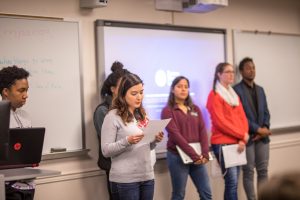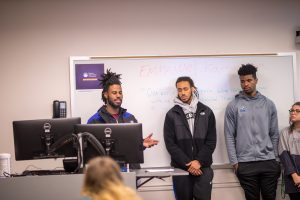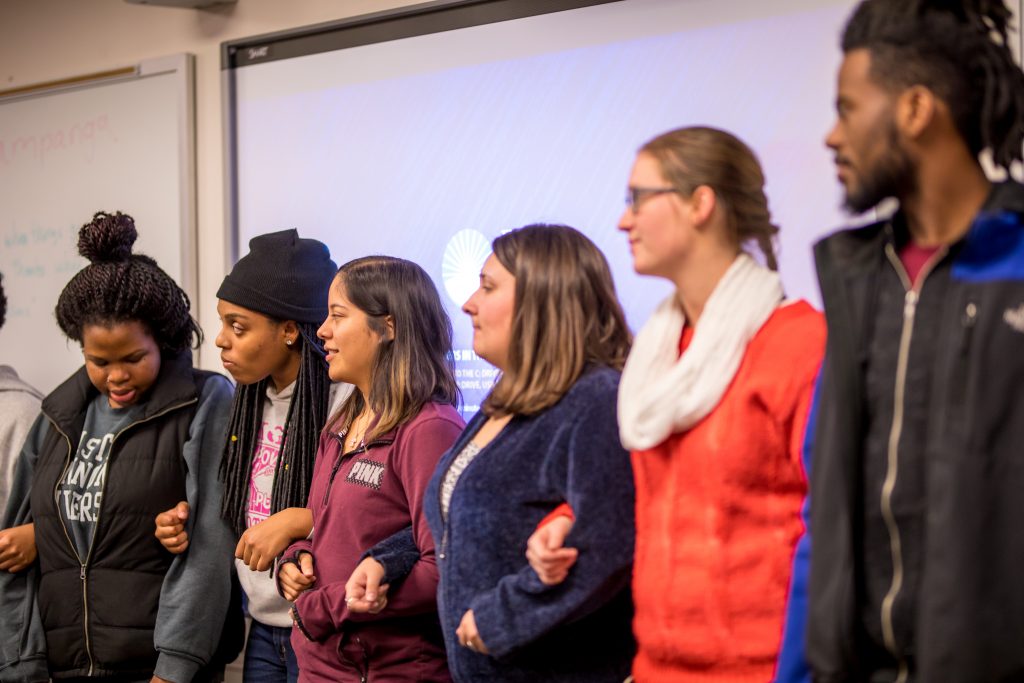In their last Fall 2017 class together, the students in SOWK 360 “Race and Gender” stood and linked arms, a living symbol of solidarity and connection after a semester of tough discussions within the national context of a charged political climate.
Professor Melody Pannell had walked alongside them through a semester of difficult conversations about societal inequality, and their capstone projects, shared in that final week, displayed a nuanced activism in and among the campus community: a sampling of topics included “The Role of Power in Social Instability,” “Bird Cage Theory” and “The Fight Against Sexism with Title IX.”
And they’d written personal statements of hope and belief.
“Students take this class because they need to talk about the issues,” said Pannell. “But along the way, they learn about the hearts and talents of each other – and about themselves.”
EMU’s MLK Week 2017 is Jan. 10-15. Get involved!
Enlightening, equipping

Senior Emmanuel Kampanga said the course was one of the most enlightening he’s taken.
“Opening up about social issues can be challenging,” he said, “but rapidly a safe space was created between the students in the class.” Now – having studied the history of racism, gender inequality and social injustice in America – Kampanga said he is equipped “advocate for what I believe in using facts rather than emotions.”
Sophomore Gabby McMillon, too, said that the class was formative.
“‘Race and Gender’ has provided me with tools and a platform to promote change in my community,” she said. “I learned what it means to be an ally and advocate. Each of us has power, and we can use that power to create change.”
Musician responds

Senior Maleke Jones’s group presented about bird cage theory, which uses the metaphor that individual wires – each a specific form of oppression – work together to make a cage that leaves “no way for the bird to escape.”
Jones was known on campus already for his music, and was inspired to weave his coursework about bird cage theory into his art, a song “Caged Bird.” It represents “how minority groups feel. Black people do get held back just because of their skin color,” he said.
“Music is universal,” said Pannell – and was a non-threatening way for Jones to tell his story. “It has such a rawness to it. It’s emotional,” she said. “If you at all know him and care about him as a person, it will cause you to think, ‘Wow, that’s how racism affects him,’ and how you don’t want that to be the case.”
The song, Jones said, is “not only a voice speaking on my behalf, it’s a voice that’s speaking for the voiceless. The people being oppressed can’t really speak out and be heard, so I just try to speak out for people who can’t with my words.”

“Just imagine being held back,” he sings, “From chasing all your dreams just because you’re black. / See this cage goes unnoticed until your eyes have been opened / To this world ran by whites and on the low they be hoping.”
Listen to Caged Bird by Maleke “Meechy Jay” Jones
Statistics reinforce the song’s lyrics. In his class presentation about power, Kampanga pointed out examples of institutional racism: in education minorities suffer greater suspension rates; in criminal justice minorities receive longer sentences for the same crimes; and in the marketplace having a black-sounding name makes a person less likely to be called for an interview.
“It’s a fight between those that have power and those that don’t have it,” he said. “Those that have power don’t want to let it go, because power comes with benefits.”
White privilege

Pannell said that it was her first time teaching the class that the roster was minority white. One senior, Elizabeth Witmer, had always considered herself an ally of minorities; in this class, she was one.
“I felt like there was a shift inside of me, saying ‘I need to take a step back and listen, and not speak so much,’” she said. “‘I need to listen.’”
What she heard were “big, burly black guys” talk about being scared, particularly whenever police are around, “powerful” stories of fellow students facing discrimination.
They weren’t textbook paragraphs; they were real stories.
Her group’s class project involved posting “Check your privilege” signs around campus, which invited white readers to reflect on positions of privilege from Peggy McIntosh’s article White Privilege: Unpacking the Invisible Knapsack, statements such as these:
- “I am never asked to speak for all the people of my racial group.”
- “I can be confident that my race won’t determine where I can rent or purchase a house.”
- “I can choose makeup or bandages in ‘flesh’ color and have them more or less match my skin.”
“Maybe if we are more intentional about remembering that we are privileged, we can be more intentional about changing our thoughts about racism,” Witmer and her classmate Sarah Regan wrote. “The fact is that racism still exists in society which means white privilege still exists. Acknowledgement of our privilege is the first step in ending that racism.”
This I Believe
The final assignment for the semester was writing “This I Believe” statements modeled on the National Public Radio essay project. In them they told personal stories of pain and awakening, quoted civil rights leaders and expressed hope for social healing.
- From Sammy Thomas: “I believe in equality for everyone. It starts with us. No more stereotypes and assumptions of people and races we simply do not know. If we simply treat everyone equally, then hopefully people will pick up on the trend and do the same.”
- From Sarah Regan: “I believe that the only place that anyone will ever ‘not belong in’ is isolation. Not one person in this world deserves the right to live more than another. Not one person deserves opportunities more than another. Not one person deserves more love and care than another. With our strengths and our weaknesses, with the colors of our skin, with our many beliefs and our many customs – In the name of Christ, we all belong.”
- From Fabiana Espinal: “I believe we all have the potential to be good, to be knowledgeable and reject ignorance, we all have the potential to be kind. I do believe, however, that it takes hard work, humility, and commitment to get there.”
